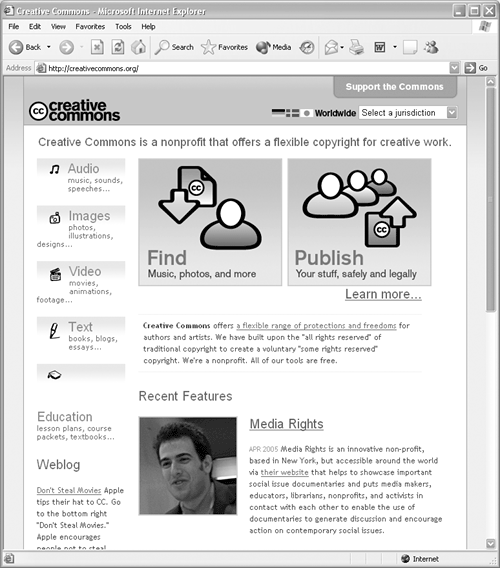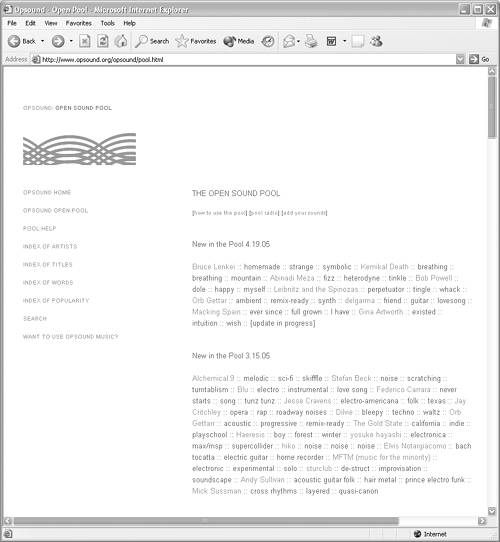| Music is a very important part of podcasting. After all, many podcasts are like terrestrial radio broadcasts, in that they play a selection of popular music. Even for all-talk podcasts, music is often part of the program in one form or another. Although music plays an important role in making podcasts sound professional, there are issues around the licensing of musical content within a podcast. Despite the limitations, there are ways (such as licensing or using Creative Commons licenses) to include music in your podcasts. It's a sticky area, however, and it's important to know the lay of the land before you try to walk across it. Legalities Few people may realize this, but each and every time a song is played on the radio, on television, or even at a sporting event, a royalty is paid to the rights holder of that song. How much of a royalty is paid depends on where the song is played. For example, the use of a song in a commercial, such as the Rolling Stones' "Start Me Up" (for Microsoft Windows 2000) or the Beatles' "Revolution" (for a Nike shoe ad), can generate hundreds of thousands or millions of dollars. On the other hand, a radio station playing a particular song might require a payment of only 16 cents. Whatever the cost, royalties are designed to reimburse the creative people who wrote and performed this music. Of course, many songs are owned not by the artists who wrote them, but by large corporations. Either way, the money is owed fair and square. As one might expect, podcasting can throw a wrench into the royalty situation when it comes to music. Are the many mom-and-pop operations creating amateur podcasts still responsible for paying royalties for the music they may use in the background during their shows? If the podcast contains licensable music, the answer is YES. Two main bodies manage royalty collection for music catalogs: ASCAP and BMI. ASCAP (American Society of Composers, Authors and Publishers) is a performing-arts organization that acts as a collector and advocate for those artists associated with it. BMI (Broadcast Music, Inc.) is similar to ASCAP in that it represents artists with regard to the collection of royalties for music that is played in public. Surprisingly, despite the sudden appearance and rapid growth of podcasting, both of these organizations have agreements that more or less cover the basics for podcasters. ASCAP has a contract known as the ASCAP Experimental License Agreement for Internet Sites & Services, Release 5.0. This license costs $288 up front and includes fairly complex fee calculations. This contract is offered on a per-year basis, and the fee is not pro-rated, so if you pay $288 on December 20, 2005, you will have to pay $288 again on January 1, 2006. This is a very dynamic area, however, and any of the above details could change even by the time you read this book. To have a look at ASCAP's license, check out www.ascap.com/weblicense. BMI has a similar license that appears to be slightly easier to negotiate. The up-front cost of this license is $283, and of course, there are also fee structures, depending on how music is used in the podcasts. To see BMI's license, go to www.bmi.com/licensing/forms/Internet0105A.pdf.  | Adobe Acrobat is required to view both of these licenses; you can download it free at www.adobe.com/acrobat. |
Bob Goyetche, of "The Bob and AJ Show" fame, says that when it comes to playing music in his show, the team ultimately looked at two alternatives: "We turned to indie musicians. We get specific permission from songwriters and performers, which gives us permission to play their tunes." "The background music we use is Creative Common licensed music from open-source music sites. Usually, the stipulation is that as long as we give attribution, we can use the material."
It is clear that if you want to create a podcast that includes popular music, and you are interested in proceeding in a legal fashion, you will have to obtain licenses from these organizations and follow them to the letter. That said, it is unclear how many podcasters are currently following these rules. It probably won't surprise anyone if these rules change in the coming months or years. Either way, it is important to stay up to date on this issue if you are an active podcaster. Creative Commons Created in 2001 by Lawrence Lessig, Creative Commons (http://creativecommons.org; Figure 3.35) is a not-for-profit organization with the goal of expanding the amount of creative work available for others to build upon and share legally. Creative Commons licenses were originally designed for the United States, but now, Creative Commons licenses can be obtained in 29 countries. Figure 3.35. Creative Commons is an excellent place to find music for your podcasts. 
This is a new system, built within current copyright law, that allows an individual to share his or her creations with others and to use music, images, and text online that has been identified as having a Creative Commons license. To learn more about the history of Creative Commons, visit http://creativecommons.org/about/history.  | It's important to note that getting a license with Creative Commons does not mean giving up your copyright. It means instead that you are giving up some of your rights to any taker, but only under certain conditions. |
Several of the podcasters I interviewed for this book mentioned Creative Commons as a source for the music they use in their podcasts. If you want to include music in your podcasts, I suggest that you visit the Creative Commons Web site and learn more about what is available. As an artist, you can choose one of several licenses, including: Attribution. You let others copy, display, perform, and distribute your copyrighted work (and derivative works based upon it), but only if they give you credit. Noncommercial. You let others copy, display, perform, and distribute your work, but only for noncommercial purposes. No Derivative Works. You let others copy, display, perform, and distribute only verbatim copies of your work. There can be no derivative works based upon your work. Share Alike. You allow others to distribute derivative works only under a license that is identical to the license that governs your own work.
The Creative Commons Web site can point you to several excellent sites that contain Creative Commons licensed sound files and music. One such site is Opsound (www.opsound.com) , shown in Figure 3.36. This site is an excellent source of music that you can use in your podcasts provided that you follow the rules of each license. If the idea of reading the license for each song gets under your skin, remember that licensing commercial music is very expensive and requires far more paperwork. Figure 3.36. Opsound is a great site for Creative Commons licensed music. 
 | Most of the music on the Opsound Web site falls under the Share Alike Creative Commons license, which means you are free to download it, share it, and include it in your work as long as you attribute the works to the original authors/musicians. The site also contains some public-domain music. |
Interview with Bob Goyetche Bob Goyetche is co-host of "The Bob and AJ Show." As the show's Web site says: "If you're looking to listen to two drunk and horny Canadian guys eating potato chips, then there's no better place than 'The Bob and AJ Show.'" Goyetche is a 36-year-old husband and father whose day job is working as an IT consultant. He's been a musician for 20 years and has always had a passion for broadcasting. AJ is a 35-year-old husband and father of two, earning his living as an electrician. Like Bob, he's been involved in music and pirate radio. Bob and AJ have been good friends for 20 years, and that shows no signs of changing. Farkas: When did you first become aware of podcasting? Bob: I first heard about podcasting early last fall, through Doug Kaye's IT Conversations site. I had been listening to downloadable programs (weren't called podcasts yet then) for a few weeks when I heard the Bloggercon conference where podcasting was discussed. Farkas: What made you decide to create your own podcasts? Bob: As a longtime radio nut, I knew I had to get into this. We used to do pirate radio in the early 1990s, and this seemed like a nice way to recapture the rush of building a listener base. I put out a test show in October, and "The Bob and AJ Show" started the following month. One thing led to another, and now, just a few months later, the "scene" is exploding, and I produce three shows, with possibly more to come.. Farkas: What were the main challenges in creating a podcast? Bob: Since we record in my home music studio, the only real technical challenges were to decide which pieces of equipment to leave out! We just wanted to be ourselves doing a show. We share a lot of the same values when it comes to what we find funny, the music we like, etc. The main challenge was learning the RSS and related technologies, and that was pretty simple. Farkas: What are your plans for "The Bob and AJ Show" going forward? Bob: Honestly, to keep having fun. We have no grand plans for commercialization, though if at some point we hook up with some sponsorship to help defer costs, we're not against it. Farkas: Are there any copyright issues with playing music on your show? Is that a fear? Bob: Not at all. We made the decision early on to play only music we had permission and rights to play. This meant no big-label music, but we're very happy with that. Independent music fits better with the vibe of podcasting. It's also opened our ears to lots of great music we otherwise wouldn't have heard. We also get to build relationships with artists, which is very rewarding. Farkas: Where do you see podcasting going in the next year? The next five years? Bob: For the next year, I think awareness will be the main accomplishment. We've come so far in seven months. I'm meeting people who I don't have to explain podcasting to, so the medium is on the radar. In the next five years, I think we'll see a buildup to an incredible number of shows. People will jump on this, and some, when they realize the effort involved, may stop. Those who keep going, though, will have found a great outlet and a great hobby. I see more commercial podcasts, much like we're seeing commercial blogs now. Farkas: Do you have an opinion on the commercialization of podcasting? Bob: The fact that commercialization is thought to be viable validates what we are doing. Unlike radio, where there is limited space on the dial, the Internet is limitless. We're not limited to 88 to 108 on some little dial. Our show has potentially the same reach as any of these companies. Our production values are equal or superior, and our passion hasn't been smothered by a radio consultant from Toronto. The way the "traditional outlets" are going to get podcast listeners is to put out programs people want to hear. I see that some Canadian radio corporations are redistributing some radio morning shows via podcast, I think they're missing the point. Podcasting is taking off because people can't stand to listen to another "morning zoo" program. It's too formulaic, too packaged, and too homogenized. I think there will be people who will enjoy the podcasts of these corporations, and more power to them. They probably wouldn't have liked our show anyway. |
|

